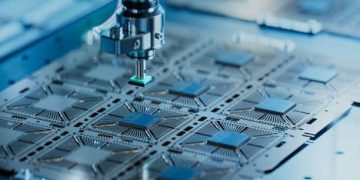Overview of Phoenix Engineering’s Expansion
Japan’s semiconductor industry is witnessing significant advancements, with companies like Phoenix Engineering enhancing their automation and robotics capabilities. Phoenix Engineering focuses on precision and reliability in wafer handling and transportation and aims to expand its presence in the US, Taiwan, and Korea. The company plans to build a robust network within Japan and continue innovating through partnerships and R&D, with a goal of becoming a publicly listed and globally recognized company.
Global Chip Shortage and Its Effects
The COVID-19 pandemic led to chip shortages, disrupting the production of various products, including cars and computers. These disruptions highlighted the fragility of the chip supply chain and the dependence on certain countries. As a result, major economies are attempting to regionalize production by attracting the construction of foundries offshore. Between 2021 and 2023, construction began on 84 new foundries with a total investment of USD 500 billion. The US, in particular, announced new facilities following the CHIPS and Science Act, positioning the region as a leader in new capital investment.
Diversification of Production Sites
The pandemic spurred the diversification of semiconductor production sites. Major companies are dispersing their production sites to ensure a stable supply, with Japan’s Kyushu region seeing the establishment of such facilities. Companies are now localizing production to create local supply chains. Phoenix Engineering is expanding both production and sales sites overseas, with a focus on transportation and wafer-cleaning systems to accommodate mass semiconductor production.
Opportunities for Japanese Semiconductor Firms
Japan has attracted investments from major foundries, including TSMC’s new plant in Kyushu and investments from Micron Technology and Western Digital. Japan’s advanced ecosystems in semiconductor materials and equipment provide a strategic advantage for onshoring production. The Japanese government has played a significant role in this, with initiatives like the digital strategy of the semiconductor industry announced in June 2021 by the Ministry of Economy, Trade and Industry (METI). Domestic semiconductor production capabilities support Japan’s strong automotive market and are essential for economic security. Subsidies for foundries, such as TSMC’s, have strengthened Japan’s semiconductor ecosystem.
Geopolitical Considerations
Geopolitical issues, such as tensions between China and Taiwan, have influenced decisions to establish semiconductor facilities in Japan. TSMC, Samsung, and SK Group are among the companies expanding in Japan, with facilities spread across regions like Kyushu, Hokkaido, and the Kanto area. This diversification mitigates natural disaster risks and contributes to regional revitalization, job creation, and economic growth.
Technological Advancements and Partnerships
The flourishing semiconductor ecosystem in Japan leads to technological advancement and innovation. Phoenix Engineering collaborates with other companies and academia, such as top universities in Japan and the USA, to patent technology and formulate academic papers. These collaborations help showcase technology and expand presence.
Wafer Transfer Devices and Challenges
Phoenix Engineering’s wafer transfer devices face challenges, such as handling larger wafers. The company incorporates features like 360-degree maneuverability, temperature monitoring, and emergency stop features to ensure precision and reliability. The PWT2020 series caters to various wafer types, including silicon carbide and gallium nitrate.
Clean Room Precision Handling
The PHT-R-4 device is designed for precision handling in clean room environments, transporting 300mm wafers. The customizable device includes features like a fan for longer operability and sensor and laser detection to read wafer status. These features ensure precision and minimize particle generation during operation.
Importance of Partnerships
Partnerships are crucial for Phoenix Engineering’s business model, especially in procurement and production. The company collaborates with multiple entities, including universities, to enhance technology and expand its global network. Current focus areas include the US and Taiwan, with plans to expand to Korea and Europe.
Future Goals
Over the next six years, Phoenix Engineering aims to expand in the domestic market and secure talented individuals through collaborations with universities, research centers, and governmental entities. The company plans to grow overseas, particularly in the US, and establish local production bases. Long-term goals include becoming a publicly listed company and being recognized as a reliable and attractive investment.
Stay current with supply chain news on The Supply Chain Report. Free trade resources are available at ADAMftd.com.
#SemiconductorSupplyChain#ChipShortage#GlobalTechIndustry#SupplyChainDisruption#TechManufacturing















